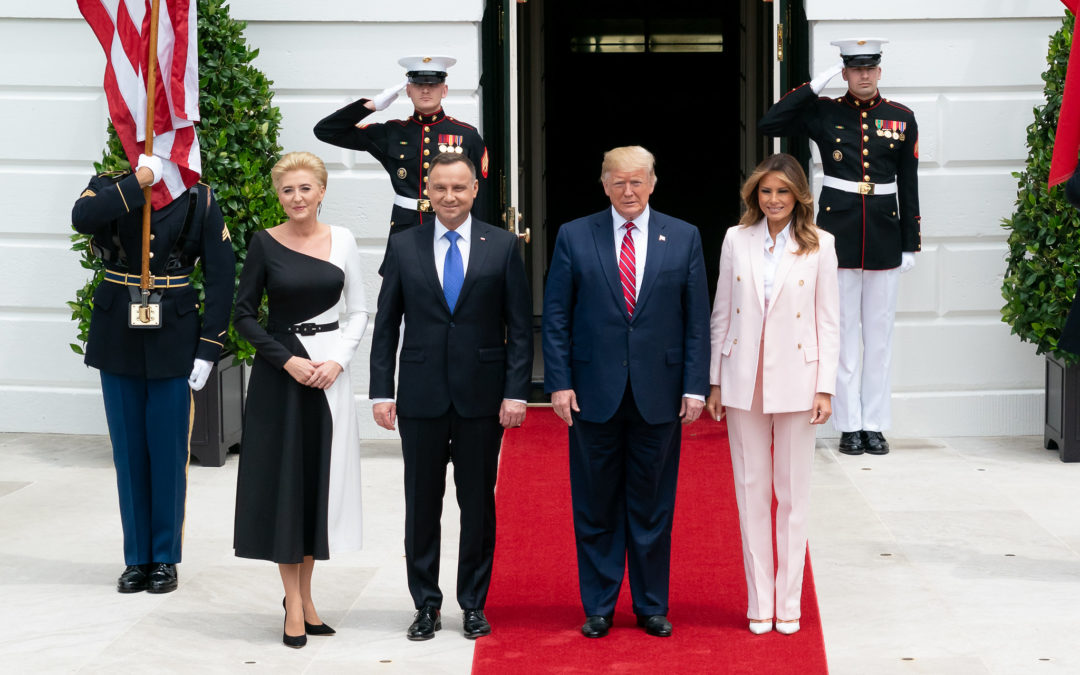By Stanley Bill
Donald Trump and Steve Bannon are in the White House. The British parliament has given Theresa May the signal to start Brexit negotiations. Populist forces are surging in France, the Netherlands, and other parts of Europe. Russia is emboldened. The liberal consensus of globalism and international cooperation seems to be faltering, as national movements gain traction. The end of an era could mean a return to a less ceremonious contest between the strong and the weak. This would be bad news for Poland. So why has Warsaw been part of the trend?
The Polish government has been very successful at pushing its controversial domestic agenda – with considerable popular support – against an increasingly ineffectual and irresponsible opposition. However, the recently escalating dispute with the European Commission over changes to the country’s Constitutional Tribunal has exposed a conflict between the government’s domestic aspirations and the interests of Poland’s foreign policy. By continuing to ignore the concerned responses of key international partners, especially in Europe, the government has lost sight of a fundamental reality of its position in the world: Poland relies on the liberal order.
The very institutions whose rebukes have prompted the government’s indignation at disrespect of its sovereignty are among the custodians of an international system without which Poland’s sovereignty and prosperity would be less secure: the Council of Europe, the European Commission, the Venice Commission, an internationalist US administration unconditionally committed to the NATO alliance. Without such irritations, the Polish government could indeed pursue its domestic plans without fear of external sanction. But without the liberal order that this criticism reflects and embodies, Poland’s security and economic development would potentially be at risk. The recent transformation in the US has brought this double-edged sword into sharp relief. Donald Trump will not chide the Polish government over the rule of law – as Barack Obama subtly did at the NATO summit in Warsaw in 2016 – but this greater tolerance is directly related to his more ambivalent commitment to upholding the norms of international cooperation and security on which Poland depends.
As a non-nuclear power with a medium-sized army and economy, Poland’s sovereignty is fragile without external security guarantees. Precisely for this reason, almost all sides of Polish politics – including ruling-party leader Jarosław Kaczyński and his allies – pushed hard after 1989 for Poland to join NATO (1999) and later the EU (2004). They understood that these manifestations of international cooperation and the solidarity of the primarily Western democracies were indispensable to Poland’s long-term security, prosperity and independence. Broadly speaking, this cooperation has been sanctified and solidified by shared values. Now with an erratic and inexperienced president in the White House, the EU facing multiple crises, and the rise of nationalist agendas everywhere, the security and economic growth that these values and their institutional framework have provided look increasingly vulnerable.
In this uncongenial climate, it is perhaps surprising that the current Polish government has compromised key international institutions underpinning Poland’s economic success and global position instead of doing everything in its power to strengthen them. Its pursuit of a sometimes dubious domestic agenda has alienated allies and exposed the underlying weakness of European institutions. In particular, the Polish government’s disregard of the repeatedly expressed concerns of the European Commission and Parliament has revealed the European Union’s inability to enforce its own norms and rules. This failure has undoubtedly represented a short-term victory for Poland’s government, but the long-term effects of adding to the EU’s woes could be economically destructive and even dangerous.
Moreover, it is difficult to define exactly what the Polish government – which already enjoys a solid majority in the national parliament – has won in return. Leaving aside the doubtful legality of its actions against the Constitutional Tribunal, one might well ask from a pragmatic perspective whether the neutralisation of perceived domestic enemies has been worth the damage to Poland’s international position. Relations with the Brexit-bound UK are presently strong (since Britain wants Poland’s support from within the EU in the coming negotiations), but Poland has few other close friends or supporters in Europe. Indeed, it is still possible that the European Commission may push to suspend Poland’s voting rights in the EU (though Hungary would probably block such a move). Meanwhile, Donald Trump’s intentions remain worryingly unpredictable, even after some more promising signs with the dismissal of Russian-friendly security adviser Michael Flynn and Vice-President Mike Pence’s recent PR mission to Europe. In a challenging and uncertain time, Poland needs to consolidate its key relationships – including with Brussels.
Domestic politics can sabotage foreign relations in any country, but Poland’s tragic history suggests a particular danger in allowing this to happen. The country’s continued reliance on international institutions and cooperation suggests that it would be in its interest to play by the rules. European structural funds still form an extremely important source of investment, predicted to represent around a third of Poland’s GDP growth in 2017. And one might well ask how Poland can expect to take Russia to the UN’s International Court of Justice at the Hague over the Smolensk crash investigation, while continuing to ignore the UN Human Rights Committee and the Venice Commission on its own constitutional crisis. A world of truly “sovereign” national states free to disregard inconvenient legalities and cooperative norms without consequence might suit a narrowly defined interpretation of the interests of a select group of powerful countries – and it certainly suits Putin’s Russia. But Poland could not possibly benefit from such a rearrangement. This would be a world of pitiless lines drawn between the strong and the weak. And the painful truth is that Poland is not among the strong.
Of course, respecting international institutions does not mean that Poland must always agree with its partners. On the contrary, as a medium-sized power and the largest of the EU’s eastern member states, it has a right and responsibility to present its own perspectives and interests clearly and persuasively. Some of the criticism of the Polish government from abroad has been exaggerated, in part because of an abiding tendency in the West to fall back on patronising stereotypes about a backward “Eastern Europe.” At the same time, there has been little recognition of the broad popular support for the governments’s social programs, which have genuinely lifted children out of poverty, or of the surprisingly successful moves to close tax loopholes and thus to maintain a respectable budget despite the new social spending. Poland is entitled to follow its own path. Sometimes there will be disagreements. More broadly, the EU undoubtedly needs reform, and Poland should contribute to this process as an equal shareholder.
However, the present Polish government seems to dream of an international system of sovereign nation states in which cooperation would take place only in those realms which happen to suit it – above all, on security and European structural funds. This is an unrealistic view. It entirely ignores the fact that these beneficial arrangements have been founded on a sense of a shared baseline of democratic values and commitment to the institutions that enshrine them. These values are now under the microscope in a tumultuous time, and Poland has been part of the problem, exacerbating a wider crisis – especially in Europe – that can only hurt the country in the long term.
The disintegration or devolution of the European Union would be a catastrophe for Poland. At least on some level, it would appear that the government has begun to recognise the danger of isolation from the mainstream. After a year of sometimes frosty relations with Germany, Angela Merkel’s recent visit to Poland saw a softening of tone from the Polish side. Nevertheless, the German Chancellor continued to underline the need for the Polish government to respond to the concerns of the European Commission and the Venice Commission. Germany wants Poland to be part of the solution to Europe’s problems, but this role comes with responsibility to uphold the institutions and values that have underpinned the European project.
Poland’s influence on the astonishingly rapid advance of the broader anti-liberal and anti-internationalist trends has ultimately been rather minor. Poland is not primarily to blame. But the Polish government has been among the helpers of chaos instead of among the defenders of the liberal order. And this is fundamentally at odds with Poland’s national interest.

Stanley Bill is the founder and editor-at-large of Notes from Poland. He is also Professor of Polish Studies and Director of the Polish Studies Programme at the University of Cambridge. He has spent more than ten years living in Poland, mostly based in Kraków and Bielsko-Biała.
He is the Chair of the Board of the Notes from Poland Foundation.




















